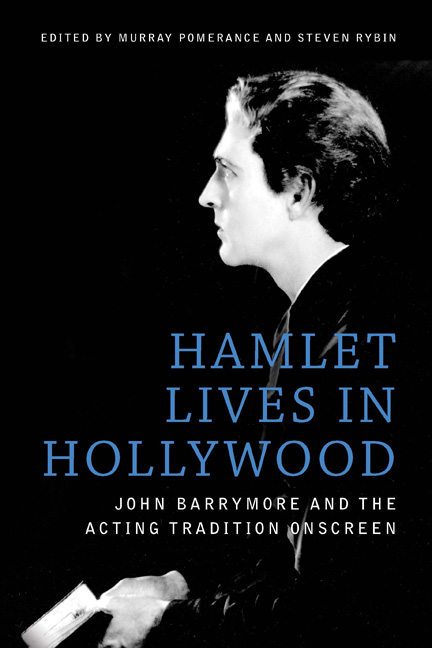Book contents
- Frontmatter
- Contents
- List of Figures
- The Contributors
- Acknowledgments
- Introduction
- 1 The Pre-Bard Stage Career of John Barrymore
- 2 Dangerously Modern: Shakespeare, Voice, and the “New Psychology” in John Barrymore's “Unstable” Characters
- 3 The Curious Case of Sherlock Holmes
- 4 John Barrymore's Introspective Performance in Beau Brummel
- 5 “Keep Back your Pity”: The Wounded Barrymore of The Sea Beast and Moby Dick
- 6 From Rome to Berlin: Barrymore as Romantic Lover
- 7 The Power of Stillness: John Barrymore's Performance in Svengali
- 8 Prospero Unbound: John Barrymore's Theatrical Transformations of Cinema Reality
- 9 A Star is Dead: Barrymore's Anti-Christian Metaperformance
- 10 Handling Time: The Passing of Tradition in A Bill of Divorcement
- 11 John Barrymore's Sparkling Topaze
- 12 “Planes, Motors, Schedules”: Night Flight and the Modernity of John Barrymore
- 13 Barrymore and the Scene of Acting: Gesture, Speech, and the Repression of Cinematic Performance
- 14 “I Never Thought I Should Sink So Low as to Become an Actor”: John Barrymore in Twentieth Century
- 15 Barrymore Does Barrymore: The Performing Self Triumphant in The Great Profile
- Works Cited
- Index
13 - Barrymore and the Scene of Acting: Gesture, Speech, and the Repression of Cinematic Performance
Published online by Cambridge University Press: 23 June 2018
- Frontmatter
- Contents
- List of Figures
- The Contributors
- Acknowledgments
- Introduction
- 1 The Pre-Bard Stage Career of John Barrymore
- 2 Dangerously Modern: Shakespeare, Voice, and the “New Psychology” in John Barrymore's “Unstable” Characters
- 3 The Curious Case of Sherlock Holmes
- 4 John Barrymore's Introspective Performance in Beau Brummel
- 5 “Keep Back your Pity”: The Wounded Barrymore of The Sea Beast and Moby Dick
- 6 From Rome to Berlin: Barrymore as Romantic Lover
- 7 The Power of Stillness: John Barrymore's Performance in Svengali
- 8 Prospero Unbound: John Barrymore's Theatrical Transformations of Cinema Reality
- 9 A Star is Dead: Barrymore's Anti-Christian Metaperformance
- 10 Handling Time: The Passing of Tradition in A Bill of Divorcement
- 11 John Barrymore's Sparkling Topaze
- 12 “Planes, Motors, Schedules”: Night Flight and the Modernity of John Barrymore
- 13 Barrymore and the Scene of Acting: Gesture, Speech, and the Repression of Cinematic Performance
- 14 “I Never Thought I Should Sink So Low as to Become an Actor”: John Barrymore in Twentieth Century
- 15 Barrymore Does Barrymore: The Performing Self Triumphant in The Great Profile
- Works Cited
- Index
Summary
Over a twelve-month period beginning in August 1926, three star vehicles for John Barrymore, all costume melodramas directed by Alan Crosland and set in highly romanticized studio-fabricated versions of medieval or early modern Europe, were released on to the United States market: two productions under Barrymore's munificent contract at Warner Bros., Don Juan (1926) and When a Man Loves (1927), and the first in his new three-picture deal at United Artists, The Beloved Rogue (1927), a fanciful account of the career of medieval balladeer and cutpurse François Villon and remake of the 1920 Fox film If I Were King.
Don Juan—which was a considerable box-office success—has a significant place in cinema history as the first film released with a synchronized recorded score and sound effects, and the film's critical reception was predictably dominated by commentary on the novelty of the Vitaphone process rather than on Barrymore's performance as the legendary lover. The two subsequent films are, by contrast, both far less remembered2 and, upon their original release, also fared less well either at the box office or critically, meeting with decidedly lukewarm reviews. A particularly notable contribution to the chorus of critical disapprobation was Stark Young's near-eulogy for Barrymore's serious acting career, published in September 1927 in The New Republic:
Since the Hamlet we have had the sex appeal movies … Of these moving pictures of Mr. Barrymore's last years, these puzzled people, looking at them and wondering afterward, can only observe that they are rotten, vulgar, empty, in bad taste, dishonest, noisome with a silly and unwholesome exhibitionism, and odious with a kind of stale and degenerate studio adolescence. Their appeal is cheap, cynical and specious. The only possible virtue in Mr. Barrymore's progress, as these films show him, is a certain advance in athletics; he is more agile, he leaps, rides and hops to a better showing, an advance encouraged no doubt by the competition with Mr. Douglas Fairbanks’ appeal … Artistically, the only thing we could say about Mr. Barrymore's performances is that he brings to them remnants of his tricks and mannerisms that stiffen them slightly and perhaps convey the sense of acting to a public that has seen but little of it …
- Type
- Chapter
- Information
- Hamlet Lives in HollywoodJohn Barrymore and the Acting Tradition Onscreen, pp. 157 - 168Publisher: Edinburgh University PressPrint publication year: 2017



